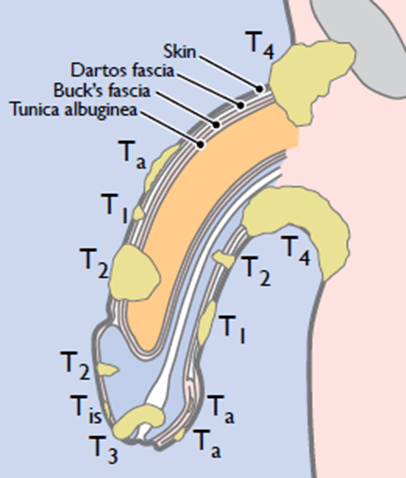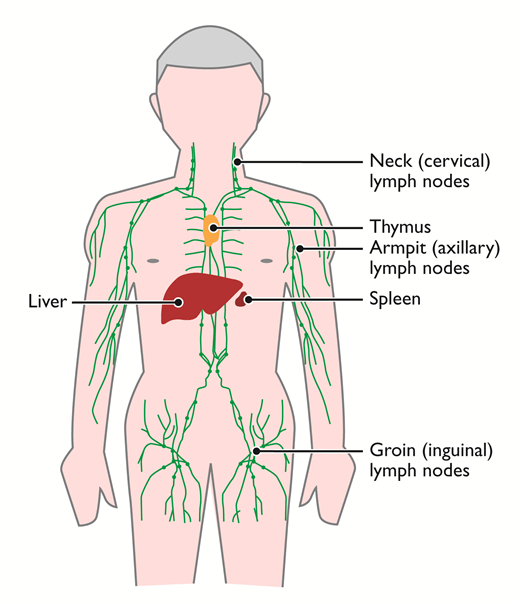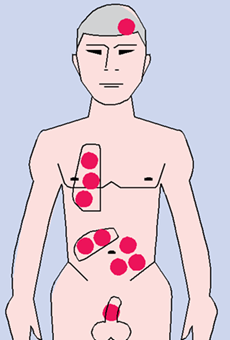Types of Penile Cancer
Squamous cell carcinoma
The most common type of penile cancer (95%) is called squamous cell carcinoma. Squamous cells are skin cells that can be damaged due to infection with HPV or inflammation. They can become cancerous on any part of the penis. This type of cancer has the potential to spread to other parts of the body.
A rarer form of squamous cell cancer is called verrucous carcinoma. This tends to progress more slowly and is less likely to spread.
Basal cell penile cancer
Basal cells are skin cells from the outer lining of the skin. Less than 2% of penile cancers are basal cell cancers.
Malignant Melanoma
This cancer sometimes occurs on the surface of the penis and is melanoma skin cancer. However, exposure to sunlight is not needed for skin cells to become cancerous. Malignant melanoma accounts for less than 1% of penile cancers.
Sarcoma
About 1% of penile cancers are sarcomas. These are cancers that develop in the tissues that support and connect the body, such as blood vessels, muscle, and fat.
Malignant Lymphoma
This type of cancer is extremely rare. It tends to be cancer which has spread from another area of the body such as the testicles.
Other cancers Squamous cell carcinoma can also develop within the urethra and affect the penis. Other types of cancer such as bladder cancer can also affect the urethra and penis. It will often be treated in the same way as penile cancer.

Staging Penile Cancer
Staging is a term used to describe how far cancer cells may have spread within the body and helps determine the best type of treatment. The most common way of describing this is called the TNM system and is based on the results of surgery, scans, and blood tests.
T stands for tumour size.
This can be given a value of 1 – 4 indicating how big the area of cancer is within the penis.
| T0 | No cancer |
| Tis | Cancer only in the top layer of the skin |
| Ta | A wart-like type of cancer that does not grow into deeper layers |
| T1 | Cancer growing into deeper layers of the skin or tissue under the skin. |
| T2 | Cancer growing into the corpus spongiosum (including the head of the penis) |
| T3 | Cancer growing into the erection chambers of the penis |
| T4 | Cancer growing into tissues other than the penis, for example the scrotum |

N stands for lymph nodes
Lymph nodes are small oval shaped structures found all over the body which filter out unwanted substances. As cancer cells spread, they can become trapped in lymph nodes.
| N0 | No lymph nodes contain cancer |
| N1 | One or two lymph nodes in the groin contain cancer |
| N2 | More than one lymph node contain cancer. This can be in one groin or in both groins |
| N3 | The cancer grows from the lymph node into the tissues around it, or pelvic lymph nodes contain cancer |

M stands for metastases
This means cancer which has spread to other areas of the body.
| M0 | The cancer has not spread to other organs or tissues |
| M1 | The cancer has spread to other organs or tissues, such as lung or bone |
Grading
Penile cancer can also be graded depending on how abnormal it may look under a microscope.
| G1 | Cancer with some features of normal tissue (low grade) |
| G2 | Cancer with few features of normal tissue (intermediate grade) |
| G3 | Cancer with hardly any features of normal tissue (high grade) |
Penile cancer can also be split it into four stages.
| Stage 0 | Cancer is only found in the top layers of skin. |
Stage 1 | Cancer has grown deeper into the skin, is low grade and hasn’t spread to lymph nodes or other areas of the body. |
Stage 2 | Cancer has grown deeper into the skin or into parts of the penis, is high grade but has not spread to lymph nodes or other areas of the body. |
Stage 3 | Cancer has grown deeper into the penis and has spread to lymph nodes but not to other areas of the body. |
Stage 4 | Cancer has grown deeper into parts of the penis, is affecting nearby organs, and has spread to lymph nodes and other areas of the body, |

Reviewed November 2023
